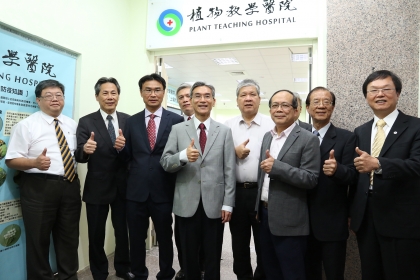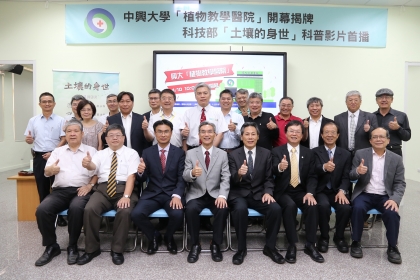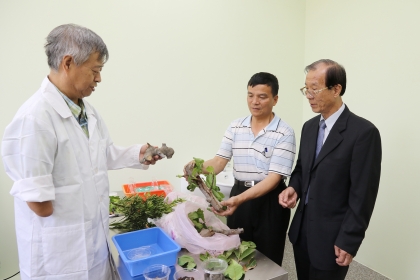Taiwan’s first plant teaching hospital launched in NCHU on April 4th, 2018.
2018-05-02
興新聞張貼者
Unit秘書室
2,927
National Chung Hsing University (NCHU) has launched the very first plant teaching hospital in Taiwan, allowing medical treatment of agricultural plants that get sick. On April 4, 2018, NCHU held the opening ceremony for the new building and in future, besides walk in appointments, the hospital also offers remote medical services and serves as an intern training unit for plant doctors.
The NCHU Plant Teaching Hospital is located at the main level of the agricultural and environmental building and also received subsidy from the Council of Agriculture, Executive Yuan. The features of the hospital include five consultation rooms for live and remote medical check-up services, one experiment and sample space, one documentation office, one meeting room for discussing clinical case studies and one doctors office. The hospital comprises of professional clinic doctors and professors in areas such as agronomy, horticulture, soil and environmental sciences, entomology, plant medicine and etc. and imitating human hospitals. Also, the NCHU plant teaching hospital has set up medical departments for plants specializing in pests and diseases and physical obstacles. Besides seeing the plant “patient” and prescribing medicines for the ill plants, the hospital also offers walk-ins and remote medical sessions. In future, the NCHU plant teaching hospital will be targeting big farms, agri-enterprises, while also providing special programs for regular farm visits by plant doctors.
Young Chiu-Chung(楊秋忠), the first appointed president of the NCHU plant teaching hospital, is a professor at the NCHU’s department of Soil and Environmental Sciences. He is also the first NCHU professor to be elected as Academician at Academia Sinica. President Yang said that in future, the doctor clinical training scheme would be identical to that of a human hospital, which means that an intern would need to be a resident before moving on to qualify as chief resident and then attending physician. The required training program allows medical students to obtain internship opportunities and cultivating practical clinical capabilities in becoming a professional plant doctor. Currently, this graduate medical training scheme is undergoing legislative approval process and hence, NCHU plant teaching hospital would prioritize its mission in being the demonstration university in establishing this new medical training scheme.
Chen Su-Chin(陳樹群), dean, college of agriculture and natural resources of NCHU said that ever since NCHU was founded as an agriculture campus and the college has not only comprehensive teaching and training academic system, but also owns a full range of promotion, inspection and evaluation centers. In order to improve domestic agriculture production skills and techniques, including plant care and protection and medical diagnosis, treatment and prevention for biological and non-biological causes in plants, Chen Su-Chin said that concerted efforts are made to realize the goal of enhancing agriculture production, while taking into account of environmental friendly and food safety.
The NCHU Plant Teaching Hospital is located at the main level of the agricultural and environmental building and also received subsidy from the Council of Agriculture, Executive Yuan. The features of the hospital include five consultation rooms for live and remote medical check-up services, one experiment and sample space, one documentation office, one meeting room for discussing clinical case studies and one doctors office. The hospital comprises of professional clinic doctors and professors in areas such as agronomy, horticulture, soil and environmental sciences, entomology, plant medicine and etc. and imitating human hospitals. Also, the NCHU plant teaching hospital has set up medical departments for plants specializing in pests and diseases and physical obstacles. Besides seeing the plant “patient” and prescribing medicines for the ill plants, the hospital also offers walk-ins and remote medical sessions. In future, the NCHU plant teaching hospital will be targeting big farms, agri-enterprises, while also providing special programs for regular farm visits by plant doctors.
Young Chiu-Chung(楊秋忠), the first appointed president of the NCHU plant teaching hospital, is a professor at the NCHU’s department of Soil and Environmental Sciences. He is also the first NCHU professor to be elected as Academician at Academia Sinica. President Yang said that in future, the doctor clinical training scheme would be identical to that of a human hospital, which means that an intern would need to be a resident before moving on to qualify as chief resident and then attending physician. The required training program allows medical students to obtain internship opportunities and cultivating practical clinical capabilities in becoming a professional plant doctor. Currently, this graduate medical training scheme is undergoing legislative approval process and hence, NCHU plant teaching hospital would prioritize its mission in being the demonstration university in establishing this new medical training scheme.
Chen Su-Chin(陳樹群), dean, college of agriculture and natural resources of NCHU said that ever since NCHU was founded as an agriculture campus and the college has not only comprehensive teaching and training academic system, but also owns a full range of promotion, inspection and evaluation centers. In order to improve domestic agriculture production skills and techniques, including plant care and protection and medical diagnosis, treatment and prevention for biological and non-biological causes in plants, Chen Su-Chin said that concerted efforts are made to realize the goal of enhancing agriculture production, while taking into account of environmental friendly and food safety.




